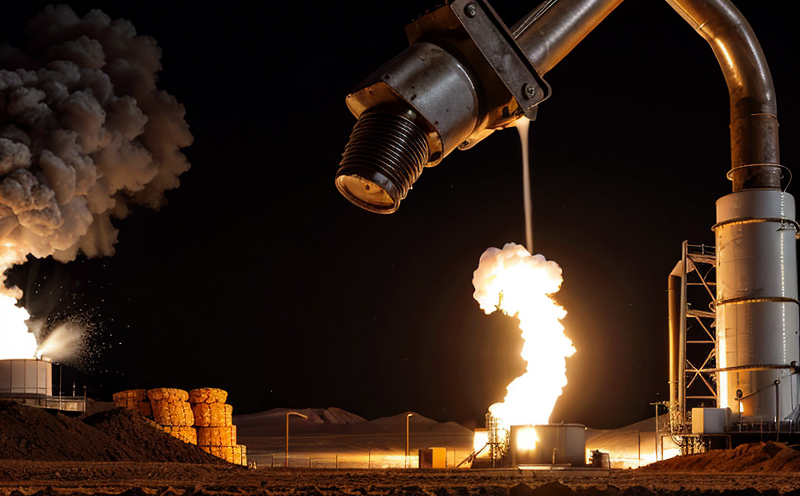ISO 10370 Carbon Residue Testing in Fuels for Trade
The ISO 10370 standard is a cornerstone of fuel quality assurance, particularly within the sectors of government and trade facilitation. This service ensures that fuels meet international standards regarding carbon residue content, which directly impacts their performance, reliability, and compliance with regulations.
Carbon residue testing, as per ISO 10370, involves subjecting fuel samples to a precise heating process under controlled conditions. The primary goal is to assess the amount of carbonaceous material that remains after the fuel has been heated and subjected to oxidation. This measurement provides critical insights into the fuel's quality and potential impact on engine performance.
For government agencies and trade facilitation entities, this test is essential for ensuring fuel consistency across borders and compliance with international trade agreements. Non-compliant fuels can lead to operational inefficiencies, increased maintenance costs, and even regulatory penalties. Our service ensures that you stay ahead of these challenges by providing accurate and reliable carbon residue testing results.
The process begins with the careful selection and preparation of fuel samples according to strict ISO guidelines. After heating and oxidation, the remaining carbonaceous material is quantified using a precise gravimetric method. This method involves weighing the sample before and after the test to determine the mass of carbon residue present.
Our team uses state-of-the-art equipment to perform these tests in controlled laboratory conditions. The precision and repeatability of our instruments ensure that each result is accurate, consistent, and traceable back to international standards. This level of accuracy is crucial for stakeholders involved in global trade, where even minor discrepancies can have significant implications.
The results of this test are vital for several reasons:
- Ensuring compliance with international fuel specifications
- Aiding in the optimization of engine performance and efficiency
- Facilitating seamless trade by ensuring quality consistency across borders
- Supporting regulatory compliance to avoid penalties and fines
In summary, ISO 10370 carbon residue testing is a critical service for government agencies and trade facilitation entities. By providing accurate and reliable results, we help ensure that fuels meet international standards, enhancing operational efficiency and compliance.
| Applied Standards | Description |
|---|---|
| ISO 10370-1:2014 | General requirements for the determination of carbon residue in petroleum products by the Conradson method. |
| ISO 10370-2:2014 | Determination of carbon residue (Conradson carbon) in petroleum products using a micro-muffle furnace and weighing the residue. |
Applied Standards
The ISO 10370 standard is widely recognized for its precision in determining carbon residue content in fuels. The two main parts of the standard, ISO 10370-1 and ISO 10370-2, provide detailed procedures for performing this critical test.
- ISO 10370-1:2014 outlines the general requirements and principles that must be followed when conducting carbon residue tests. This part ensures consistency across different laboratories and regions, thereby enhancing reliability and comparability of results.
- ISO 10370-2:2014 specifies the detailed method for determining carbon residue using a micro-muffle furnace. It includes step-by-step procedures, safety measures, and quality control checks to ensure accurate measurements.
The application of these standards ensures that our testing service is not only compliant with international regulations but also meets the highest industry benchmarks. This commitment to precision and accuracy is what sets us apart in the field of government and trade facilitation testing.
Benefits
- Increased Operational Efficiency: By ensuring fuel quality meets international standards, you can improve engine performance and reduce downtime.
- Enhanced Compliance: Stay ahead of regulatory changes by having accurate and reliable test results that meet all relevant standards.
- Reduced Risk: Avoid the financial and reputational damage associated with non-compliant fuels through rigorous testing.
- Improved Customer Satisfaction: Ensure fuel quality consistency across different batches, leading to better customer trust and satisfaction.
The ISO 10370 carbon residue test is a crucial service that supports these benefits. By leveraging this standard, you can enhance your operations, reduce risks, and meet the highest industry standards in government and trade facilitation testing.
Customer Impact and Satisfaction
The impact of ISO 10370 carbon residue testing extends beyond compliance; it directly affects customer satisfaction and operational efficiency. For government agencies, this test ensures that fuels meet international standards, which is critical for seamless trade facilitation. In the realm of global trade, consistency in fuel quality is essential for maintaining supply chain reliability and reducing disruptions.
For procurement teams, accurate carbon residue testing helps them make informed decisions about fuel suppliers, ensuring that they choose partners who adhere to high-quality standards. This not only enhances operational efficiency but also builds trust with trading partners and customers.
The satisfaction of our clients is a key metric for us. We strive to provide results that are not just accurate but also actionable, enabling stakeholders to make informed decisions about fuel quality. By leveraging ISO 10370 standards, we ensure that every test result contributes to the overall goal of enhancing operational efficiency and compliance.





